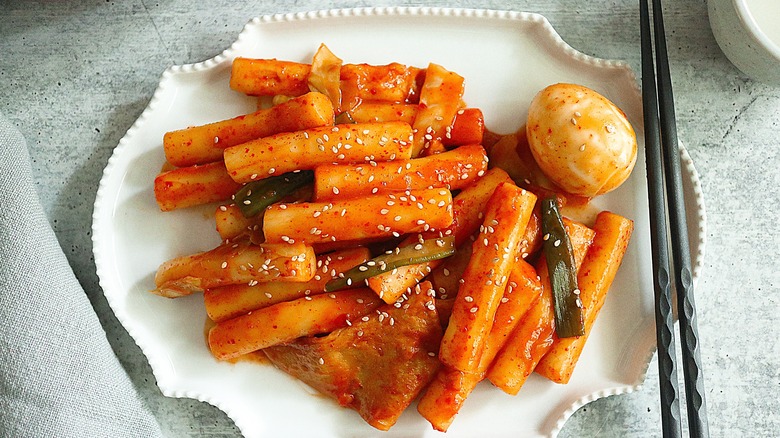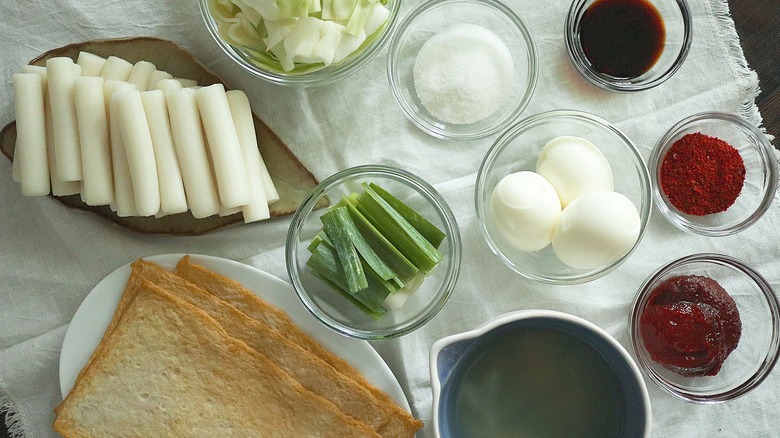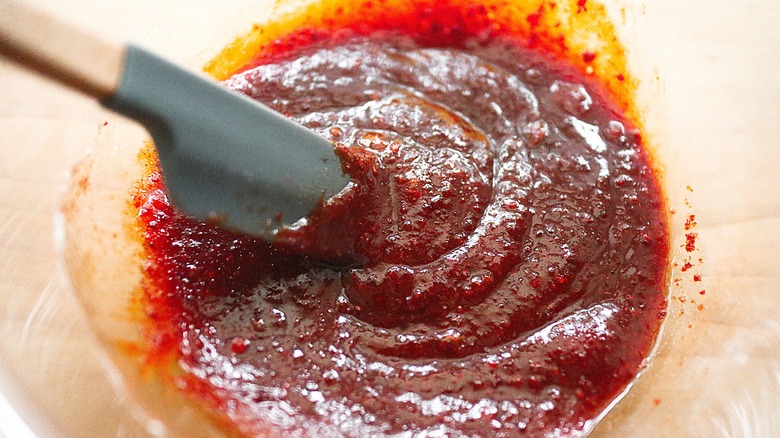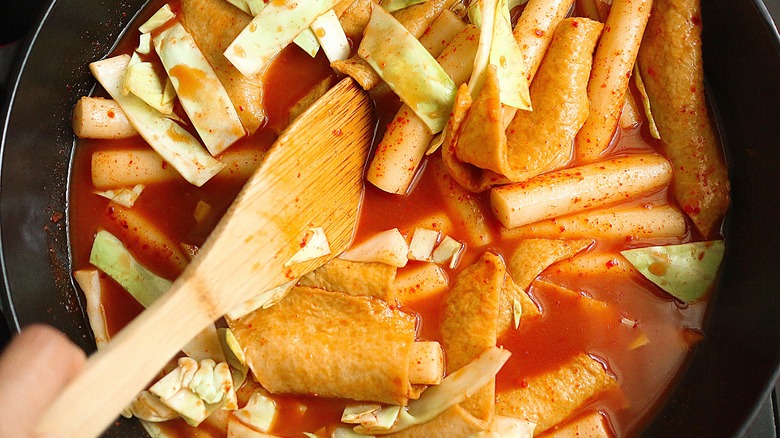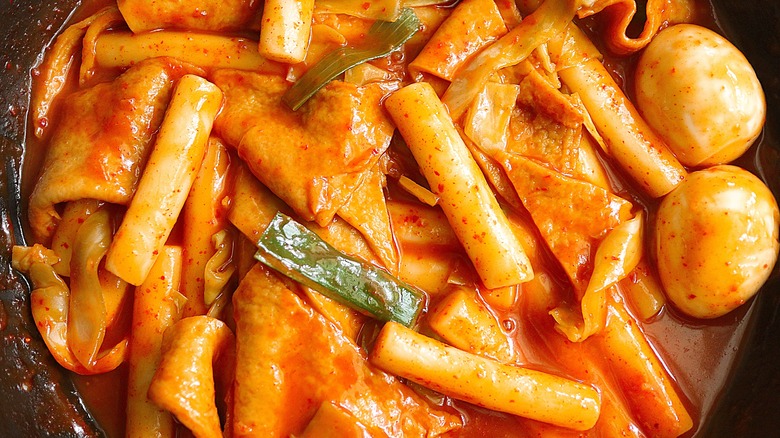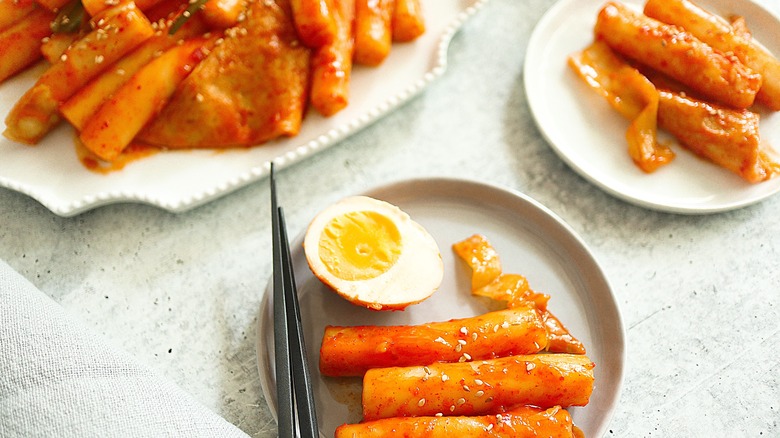Spicy Tteokbokki Recipe
In Korean culture, tteokbokki (spicy rice cakes) is one of the most popular dishes you can make. According to Taste Atlas, the dish came to be in the Joseon dynasty period, which stretched from 1392 until 1910 (via Khan Academy). People used it as a cure for illnesses, and they served it to the royal court. However, it wasn't until the 1900s that the spicy chili paste called gochujang was introduced to this dish, giving it a very distinguishable bright red color. Today, people in Korea often enjoy tteokbokki as a street dish, but it may be hard to find if you don't live there. If you want a little taste of Korea right at home, then we have the spicy tteokbokki recipe for you.
Recipe developer Cecilia Ryu shares a tteokbokki recipe that is perfect for spice lovers and foodies alike. "Tteokbokki, in general, is the epitome of Korean comfort food," Ryu says. "I didn't spend my childhood in Korea, but most of my friends who grew up in Korea say that tteokbokki reminds them of their childhood. It's a snack they ate after school at food carts. There are tteokbokki food carts in many places in Korea but especially around schools." Ryu also explains the taste of this authentic dish: "Tteokbokki is made with rice cakes, and the texture is very chewy. It's hard to explain, but the chewiness makes it fun to eat, and the sweet and spicy sauce is addictive!"
Regarding modern recipes, Ryu notes, "Nowadays, there are many varieties of tteokbokki. Some are made in a cream sauce, or cream is added to the spicy sauce to make a pink sauce." You can also swap the add-ins with things like ramen noodles or dumplings.
Gather the ingredients for this spicy tteokbokki recipe
As with any other recipe, the first step in the process is to gather the ingredients. You will need gochujang (a Korean red pepper paste) and gochugaru (Korean red pepper flakes), soy sauce, sugar, Korean rice cake cylinders, fish cake sheets, anchovy broth or water, chopped green cabbage, a scallion, and boiled eggs. The recipe also calls for one optional ingredient — roasted sesame seeds for the garnish.
Once you have those items, you can whip up this spicy tteokbokki recipe.
Make the spicy tteokbokki sauce
First, grab a small bowl and start loading it with the ingredients needed to make the spicy tteokbokki sauce. Just toss in the gochujang, 1 teaspoon of gochugaru, soy sauce, and 1 ½ tablespoons of sugar. Use a spoon or spatula to mix, ensuring the ingredients are well combined. "The sauce is sweet and spicy. You can adjust the spiciness by adding more or less gochugaru, and the same with the sweetness by adding more or less sugar," Ryu advises.
Set the sauce to the side for the time being since you don't need it quite yet.
Begin assembling the tteokbokki
Take out a large skillet and place it on your stove. Crank the heat up to medium and pour in the anchovy broth or water. Bring the liquid to a boil, then add the reserved tteokbokki sauce, rice cakes, fish cakes, and cabbage.
Turn the heat to medium and continue cooking until the rice cakes soften and the sauce thickens. This should only take about 5 to 7 minutes. Be sure to stir often to prevent the rice cakes from sticking to the pan. To adjust the spice level, add more gochugaru if you want it spicier or more sugar if you want it sweeter.
Add boiled eggs and scallions
You will only need to add two more ingredients to the mix — the boiled eggs and the chopped scallion. Once you add those to the skillet, turn the heat to low and cook with the other ingredients for 4 to 5 minutes.
Sprinkle with sesame seeds and serve
Remove the mixture from the heat and garnish with sesame seeds if you choose to do so. This dish is best when served immediately, so it's nice and hot. "This can be eaten as a main dish, side dish, late night snack, essentially any time of the day," Ryu notes. As for serving suggestions? "I love to eat tteokbokki with fried dumplings and dip the dumplings in the tteokbokki sauce." Yum!
So what's the deal on leftovers? "You can store leftover tteokbokki covered at room temperature for a day or in the refrigerator for up to 3 days," Ryu says. "Unfortunately, tteokbokki doesn't reheat too well. The texture of the rice cake gets hard and dry after a day. I would suggest reheating it on the stovetop on low and adding a little water to loosen the sauce."
We hope this traditional Korean dish hits the spot!
Spicy Tteokbokki Recipe
Tteokbokki (spicy rice cakes) is one of Korea's most popular dishes. This recipe shows how easy it is to make the spicy street food at home.
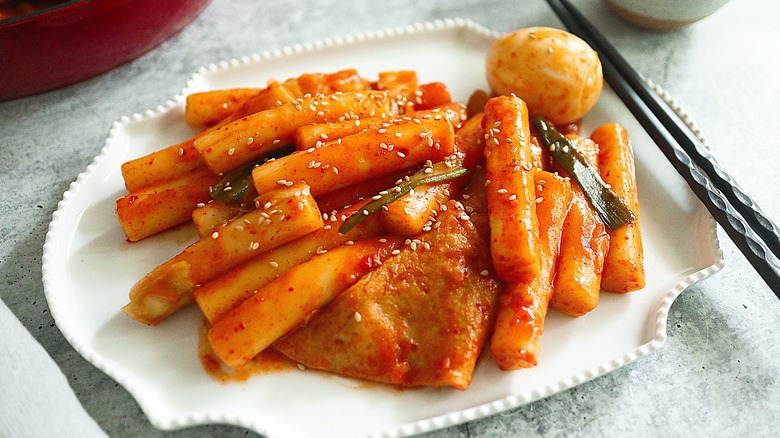
Ingredients
- 2 tablespoons gochujang
- 1 teaspoon gochugaru (or more, to taste)
- 1 tablespoon soy sauce
- 1 ½ tablespoons sugar (or more, to taste)
- 1 pound Korean rice cake cylinders
- 3 fish cakes sheets, cut into small triangles
- 3 cups anchovy broth or water
- 1 cup chopped green cabbage
- 1 scallion, cut into 1-inch pieces
- 3 boiled eggs
Optional Ingredients
- roasted sesame seeds, for garnish
Directions
- To make the tteokbokki sauce, mix together the gochujang, 1 teaspoon gochugaru, soy sauce, and sugar in a small bowl. Set aside.
- In a large skillet over medium heat, add the anchovy broth (or water) and bring it to a boil. Add the reserved tteokbokki sauce, rice cakes, fish cakes, and cabbage. Continue to cook over medium heat until the rice cakes have softened and the sauce has thickened, about 5-7 minutes. Stir frequently to prevent the rice cakes from sticking to the pan. Check for seasoning by adding more gochugaru for extra spice or more sugar for added sweetness.
- Add the boiled eggs and chopped scallions. Reduce heat to low and cook for another 4-5 minutes. Garnish with sesame seeds and serve immediately while hot.
Nutrition
| Calories per Serving | 651 |
| Total Fat | 14.8 g |
| Saturated Fat | 3.4 g |
| Trans Fat | 0.0 g |
| Cholesterol | 173.6 mg |
| Total Carbohydrates | 105.6 g |
| Dietary Fiber | 6.2 g |
| Total Sugars | 7.5 g |
| Sodium | 1,347.1 mg |
| Protein | 23.2 g |
